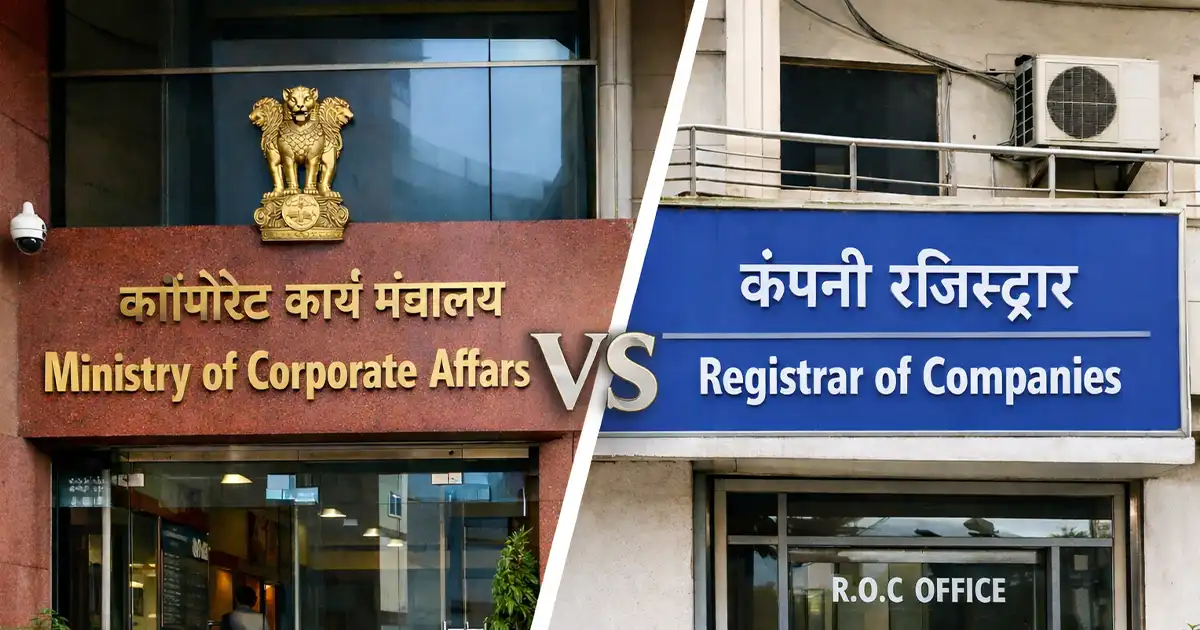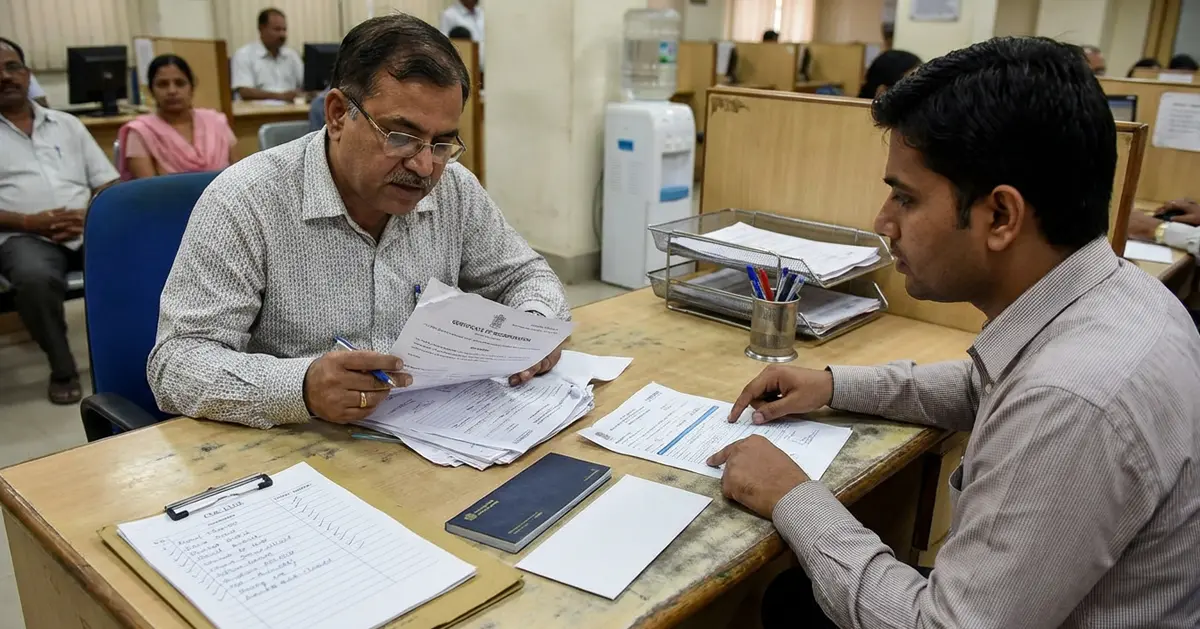
Setting up a company in India requires following the legal and regulatory rules. The Ministry of Corporate Affairs (MCA) regulates companies, enforces the Companies Act, 2013, and ensures transparency. Entrepreneurs must understand the MCA to register their businesses correctly.
This guide explains the MCA’s role in company registration. Additionally, it shows how businesses can interact with the MCA efficiently. For instance, you can check registration status on the MCA portal. Besides this, the government body protects investors, promotes ethical business practices, and simplifies registration procedures.
Working with the MCA ensures smooth registration. By following its rules, businesses can build a strong legal foundation and avoid common errors.
Functions of the MCA
Here are the major functions of the MCA in India. These functions guide business operations, ensure legal compliance, and protect stakeholders.
- Company Registration: Registers new companies and maintains official records.
- Regulation and Administration: Enforces the Companies Act, 2013, and related laws.
- Corporate Governance: Promotes ethical and responsible business practices.
- Investor Protection: Safeguards the interests of investors and stakeholders.
- Facilitating Business: Simplifies registration, compliance processes, and access to company information.
- Handling Insolvency and Bankruptcy: Oversees corporate insolvency processes under the Insolvency and Bankruptcy Code.
- Updating Corporate Laws: Proposes and implements amendments to corporate laws and regulations.
- Promoting CSR: Ensures companies comply with Corporate Social Responsibility provisions under the Companies Act.
How the MCA Supports Company Formation
The MCA plays a key role in helping businesses form legally recognized companies in India. First, it ensures that all steps comply with the law. Next, it verifies essential documents and provides necessary approvals. Moreover, it simplifies processes to save time and reduce errors.
- Name Approval: Reviews and approves the proposed company name.
- Director Identification: Issues Director Identification Numbers (DIN) necessary for company directors.
- DSCs: Facilitates the issuance of Digital Signature Certificates (DSCs) for electronic document signing.
- Incorporation Documents: Receives and verifies important documents like the Memorandum of Association (MOA) and Articles of Association (AOA).
- COI: Grants the official Certificate of Incorporation (COI), signifying the legal formation of the company.
- Document Verification: Checks all submitted documents for accuracy and legality.
- Compliance Enforcement: Confirms that company objectives and practices follow the Companies Act.
- Record Maintenance: Maintains an official registry of all registered companies.
- Public Access to Information: Provides access to company data for transparency.
MCA Role in Company Setup
Understanding MCA responsibilities helps businesses stay compliant and complete the registration process smoothly.
a. Providing Online Services
- MCA Portal: Submit forms, check application status, and access resources online.
- Simplified Proforma for Incorporating Company Electronically (SPICe): Streamlines company incorporation for faster processing.
- Central Registration Centre (CRC): Approves name reservations and company incorporations quickly.
b. Support and Guidance
- Helpdesk Services: Assists applicants with queries and technical support.
- Educational Resources: Offers guidelines, FAQs, and instructional materials on compliance and procedures.
Steps in Company Registration Involving MCA
Setting up a company in India requires careful compliance with legal procedures. Therefore, knowing how to check company registration in the Ministry of Corporate Affairs helps entrepreneurs stay informed throughout the process. Here’s a step-by-step guide to complete company registration with the MCA.
Step 1: Obtain DSC
- Directors and authorized signatories apply for DSCs to sign electronic forms securely.
- In addition, the ministry accepts DSCs as legally valid for all online submissions.
Step 2: Apply for DIN
- Each director applies for a unique DIN through the MCA portal.
- After that, it assigns the DIN to officially identify directors in the company records.
Step 3: Reserve Company Name
- Submit the proposed name through the RUN or SPICe+ form.
- After that, the government body reviews the name and approves it if it meets naming rules.
Step 4: Prepare Incorporation Documents
- Draft the MOA and AOA.
- Additionally, collect director consents and proof of registered office address. MCA verifies all documents.
Step 5: File for Incorporation
- Submit SPICe+ with all required documents and declarations.
- After receiving incorporation documents, the ministry checks compliance and approves the application.
Step 6: Receive COI
- Finally, the MCA issues the certificate electronically after approval
- The certificate includes the CIN and confirms the legal formation of the company.
Steps to Check Company Registration Status on MCA
Checking your company registration status on the MCA portal is simple. Follow these steps:
- Visit the MCA Website: Go to the MCA portal.
- Access ‘MCA Services’: Click on the “MCA Services” tab on the homepage.
- Select ‘View Company/LLP Master Data’: This option lets you check company details.
- Enter Company Information: Provide the company name or registration number.
- Solve the Captcha: Enter the captcha code shown on the screen.
- Submit Your Request: Click the “Submit” button to view the status.
- Review the Details: The portal will display registration status, directors, and other official information.
Following these steps keeps you updated on your company’s legal status.
Importance of MCA Compliance Post-Registration
Compliance with MCA regulations continues after incorporation. Following these rules helps companies maintain good standing and ensures a smooth company registration process in the MCA.
i. Annual Filings
- Submit financial statements through Form AOC-4.
- Also, file the annual return using Form MGT-7 to provide updated company information.
ii. Event-Based Filings
- Report director appointments or resignations via Form DIR-12.
- Moreover, update changes in share capital using Form SH-7.
iii. MCA Monitoring
- MCA scrutinizes all filings to ensure accuracy and legal compliance.
- Otherwise, it imposes fines and penalties for late or incorrect submissions.
Common Mistakes and How to Avoid Them
Navigating the government body’s role in company setup can be tricky. However, avoiding common mistakes ensures a faster and smoother registration.
- Submit incorrect or incomplete forms, causing delays or rejection.
- Ignore naming guidelines, leading to name rejection.
- File documents late, attracting penalties and legal issues.
- Provide inaccurate director or shareholder details, causing verification issues.
- Miss deadlines for annual filings, risking fines or legal complications.
Tips for Smooth Registration
- Double-check all documents for accuracy and completeness.
- Learn MCA rules and naming conventions before submitting forms.
- Use the company registration check in MCA to confirm all details and filings are correct.
- Keep a schedule of important filing dates to avoid late submissions.
- Maintain accurate records of directors, shareholders, and registered address.
- Seek professional help from a company secretary or legal expert if needed.
Useful Resources and Contact Information
Leveraging MCA resources can aid in successful company registration.
MCA Portal
- Website: www.mca.gov.in
- Services: Forms download, filings, and company data search.
Helpdesk
- Contact: MCA customer care for technical support.
- Email: appl(dot)helpdesk@mca(dot)gov(dot)in
- Phone: Toll-free numbers available on the MCA website.
Conclusion
Understanding the MCA’s role in company registration helps entrepreneurs set up their companies correctly and efficiently. In addition, the ministry ensures legal compliance, supports business formation, and maintains corporate governance standards.
By following MCA guidelines and engaging proactively, businesses can complete registration smoothly and build a strong foundation for ongoing compliance. Finally, use MCA resources, avoid common mistakes, and seek professional help when needed to ensure long-term success.
Frequently Asked Questions
- The MCA registration check verifies whether a company is legally registered in India. It provides official details like
- CIN
- Directors
- Registered address
Therefore, businesses can confirm authenticity before engaging.




